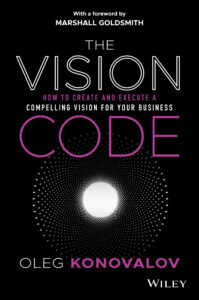Create a Compelling Vision
Meandering from point to point is not a coherent strategy and yet it is far too prevalent in many organizations. Leaders often struggle with creating a compelling vision, leaving it to chance or crafting lofty statements that mean little.
That’s where Oleg Konovalov, business educator, consultant, coach, and a top global thinker on leadership wants to help. His book, The Vision Code, provides helpful tips to crafting a compelling vision for your business.
What is the Oleg Konovalov definition of vision?
Vision is aspiration for the future that we strive to make a reality today. Vision is a future reality created today for the benefit of others.
On one hand, a vision is a future reality we foresee and strive to build. On the other hand, it is a disruptive force that allows a higher stage of satisfaction by creating something real and practically useful for many people.
A vision is not a mere statement drafted during a board meeting so it can be nailed on an office wall and gives people something to look at when waiting for the meeting to start. Statements don’t define the future or inspire people.
A solid vision opens up a multidimensional space in which anything is possible. Having a vision is like looking at the present from the future’s standpoint. There is only a slim chance for success in a flat two-dimensional reality.
Vision is greater than an organization, is greater than an individual.
Vision comes when a conscious awareness of a problem we want to solve for a benefit of others reaches its peak. We can get a vision of something that we are most concerned about. How great is this problem that one is prepared to devote one’s own life to solving it for the benefit of many? This ‘why’ is the pain of others which will not let the visionary rest.
Why is vision critically important? Is this importance growing?
Vision is a meaningless term unless we truly understand its importance and value. If people don’t fully understand the importance of vision for themselves and others, they will never appreciate someone else’s vision, its greatness, and prominence. They will never commit to it.
In fact, there are seven core reasons why vision is important.
Vision defines our highest purpose and makes our purpose come to life. This is about making life and business meaningful.
Vision defines our Why. ‘Why’ is a question caused by our curiosity as to how we can do something better and finding a compelling reasoning for changing ourselves.
A means and a tool to create the future you want to live in. Life is not a place we live but a path we take. Vision defines a path into the future down which one must lead others.
Vision is a ladder which a capable leader uses to reach success. Using a sports metaphor, we can say that to get from a second division to a premier league one must have a vision as a layout for greater achievements.
Breaking out of unsatisfactory present or negativity. Creating a profoundly brighter future is a cause which is greater than anything else.
Vision works as an ultimate uniting force that pulls people to it and towards each other. People united around a common goal are unstoppable. Vision is a magnet!
Vision is a provision of inspiring life. Inspiration feeds vision which in turn generates more inspiration.
The importance of vision becomes increasingly important as the pace of change accelerates. Vision creates the fertile ground on which we build the future. At the same time, vision is a single most valuable tool that allows leaders to choose their companies future. Without this, there will be no long-term progress.
What are some of the major mistakes people make when developing a vision?
The truth is that we are the worst enemies of our own visions. The reason behind this assumption is simple – we are not prepared to accept our own weaknesses and look for someone or something beyond our control to blame. In reality, the main enemies of vision reside in us – negativity, lack of confidence, detachment from reality, too much comfort, ego, and other anti-vision forces threaten to kill vision before it is fully formed.
We often are not prepared to be seen as different, unusual. It’s in our DNA to want to conform. But we also have our free will to choose who we want to be and what we want to create. Strict conformity in all ways at all times prevents us from being who we truly are. It is about being a whole personality. Not perfect, but solid and whole.
How do aspiring leaders develop this leadership skill?
We must grow stronger to lead a greater vision. The very first advice is to learn like a child when starting every new project or facing a new stage of life. At the same time, effective development demands well-planned everyday effort and a means of assessing progress. Every gap in preparation is reflected in delays at a later stage.
A leader should nurture and develop this competence through five critical elements – courage to think differently and boldly; constantly learn to be able to give people more and manage more complicated tasks; grow an inner excellence as leading is not a physical work but psychological; be confident and credible, which is about how one delivers promises to others and without credibility a vision wouldn’t have this magnitude; and develop a knowledge bank, or consistent engagement and contribution of all involved in terms of growing the vision strong.
In The Vision Code I share a weekly CLICK self-assessment form to help track and monitor an evolution as a visionary. CLICK stands for Courage, Learning, Inner Excellence, Credibility and Confidence, and Knowledge Bank.
In your research did you find some leaders more oriented to vision and others execution?
My research revealed a shocking fact. We are living in a time of leadership blindness. All leaders claim to have a vision. At best, the vast majority are only pretending. In truth, about 0.1% of business, social, or political leaders actually have a vision.
Modern leaders often substitute money and performance indicators for vision, forgetting that without vision, no amount of time, money or resources can help.
The vast majority of leaders are managers focused on execution and juggling with the consequences of their blind leadership. We hardly know where we lead ourselves and others. We think about the past a lot, we think a bit about the present, and we think very little about the future. As a result, we drag old mistakes from the past into the future.
Visionaries are leaders who managed to turn their vision into a reality despite many challenges. None of them talks about sales, operations, or any other functions that ordinary leaders tend to lean on and consider as the core drivers of execution. They talk about strong leadership first.
We have to remember that we live in a world now where consensus increasingly has become very important for everyone to secure. The biggest problem is that vision cannot be created through consensus. Consensus comes into play when a leader has no idea where to go and seeks instead to please everyone.
What are some ways to test a vision before execution to be sure it is viable?
A beauty of vision lies in its structure. That may sound strange, but whenever we want to create something strong and beautiful, it must be clearly and effectively structured, whether it be an airplane, software, or vision. Vision is pragmatic and functional. Not to mention that it must be future-ready, shock-resistant, and idiot-proof.
 The greatness of a vision matters more than the size of the organization. Great vision allows organizations to grow and remain valuable for many years ahead. It acts as a force multiplier by helping to solve multiple problems for people across countries and continents.
The greatness of a vision matters more than the size of the organization. Great vision allows organizations to grow and remain valuable for many years ahead. It acts as a force multiplier by helping to solve multiple problems for people across countries and continents.
Vision must address people’s needs, be easy to understand, scalable and growing, lead to success, and stir the emotions. Every great vision has six firm criteria that reflect these properties – stimulus, scale, spotlight, scanning, simplicity, and excitement.
Vision must be revised on a monthly basis in order to verify its relevance, viability, functionality, and growth potential. A Vision Viability Questionnaire or Test offers the simplest and most practical way of evaluating a vision. This test consists of eighteen questions that would help leaders and their teams maintain the viability of a vision at every stage of its development.
Communicating and selling a vision are important skills. Share with us your thoughts on this and getting others on board with the vision.
Communication makes vision visible and attractive to others. It can inspire the visionary’s passion in others, or drive people away. A poorly communicated vision is dead if not successfully shared with others.
Communication is an essential property of vision whose primary role is to make vision a collective property, giving it away so others can participate in it. A vision’s strength is determined by how well it is communicated to others making them co-owners of the vision. When this is done well, it can generate any number of unexpected results.
The true magic in communicating vision lies in the ability to encourage ownership of the vision in others. Sharing your vision and encouraging the ownership in others definitely will lift them to the higher and in-depth purpose which in turn will increase the engagement and buy in.
We communicate facts and information, and we share emotions and stories. We reach minds by communicating vision. We reach hearts and souls by sharing it. Sharing helps get the vision into the unconscious mind and thus, has an in-depth effect in engaging people and turning them into real participants. The more you share, the more energy a vision will gain from supporters.
You share, at the close of the book, some of your personal journey. Looking back, did you have a vision of where you would be today? What would you tell an eighteen-year-old Oleg if you could share wisdom with him?
There are four important lessons that need to be learned as early as possible:
Be curious.
Curiosity and imagination feed aspirations that one day will turn into a vision. Imagination is the mother of vision. Starting with often unclear signs, it grows into something real, strong, and compelling.
Live a meaningful life.
Life is meaningless and empty unless I make it meaningful. I’m responsible for making my life meaningful. The greatest beauty in the world is a fulfilled life. I steal from the world if I’m not using my life purposefully.
Don’t focus on yourself, focus on the world.
As soon as I shifted my focus from myself to the world, I saw the beauties of this world, the awesomeness of tranquility, the miracle of a storm. I learned that I expand myself by giving and adding value to others and helping them to grow. If you focus on yourself, you will feed your ego which will kill your vision instantly.
Do not allow anyone to silence your vision.
Vision gives that crucial forward view for those brave enough to look at the eyes of the future and take a chance. Don’t hold onto your anchor when you have sails and wind.
For more information, see The Vision Code.
Image Credit: Matt Noble

